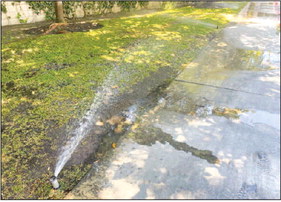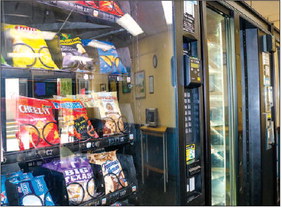LWers are using less water but now is not the time to relax


WATER CONSERVATION
The City of Seal Beach reports that Leisure World residents used 15% less water in October as compared to September.
“This is a good sign,” said Iris Lee, the city’s deputy public works director. “But we should not relax on these important water conservation measures.”
There are a number of free virtual classes offered for landscape design and irrigation principals offered free of charge by Metropolitan Water District. For more information, visit https://www.bewaterwise. com/classes.html#find-classesin- your-area.
Residents are asked to continue implementing these important water conservation measures: Kitchen
• There’s nothing as refreshing as a cold drink of water, but don’t let the faucet run to get it. Chill a container of water in the refrigerator instead.
• Avoid running the faucet over frozen food to defrost it; put it in the refrigerator the night before or defrost in the microwave.
• Rethink any tasks usually performed under running water—like washing vegetables or brushing teeth. (A gallon of water is wasted if the faucet is half open for 1 minute.) Use a dishpan or bowl to catch the water instead of letting it run down the drain. Then pour the water from the bowl onto your house plants.
Appliances
• Set the water level on wash-
WATER, page 20 ing machines to match the size of the load. Try to avoid doing frequent small loads; whenever possible, run the machine only when when it is fully loaded.
• People don’t need to rinse dishes before putting them in the dishwasher. Hand rinsing dishes under the faucet uses up a lot of water. Use the dishwasher’s pre-rinse cycle instead of hand rinsing. If a dish or two isn’t completely clean after the dishwasher cycle, finish the job by hand.
• Like the washing machine, only run the dishwasher when it’s full. When possible, wash dishes by hand in a sink—not under a running faucet. Use a second basin or dishpan for rinsing.
Bathroom
The bathroom offers the next biggest opportunity to save water.
• Make sure toilets are all working properly. According to the American Water Works Association, the average American home loses more than 15 percent of all water used to leaks. Call a Mutual director for a leaking toilet. Leak detection tablets can help people check for leaking toilet components. Up to 20 gallons of water a day can be lost this way. If you hear water running in an adjacent unit, call Security.
• Keep showers as brief as possible or turn the water off while shaving or scrubbing in the stall.
• When taking a bath, close the drain while the water warms up, then adjust the temperature. Monitor the tub as it fills, and turn the water off at the half-way mark.
• Turn off tap water while brushing teeth.
Outside
• Sprinkler set-ups can be overwatering lawns and greenbelts. Residents should report standing water that could be attributed to sprinkler overwatering to their Mutual directors. These puddles also foster mosquitos, which can exacerbate the potential for West Nile Virus.
• Use a broom, not the garden hose, to wash off patios or sidewalks.
• Use the car wash located at Clubhouse 2 as it uses recycled water.
• Water gardens in the morning or later in the evening, when temperatures are cooler.
Water conservation begins with each individual. If each member makes a few simple adjustments to his or her household routine, the community can conserve thousands of gallons of water and save thousands of dollars each year.
In California’s Mediterranean climate, winter rains typically taper off and end in the spring. By November, rain usually arrives and wets down the landscape, dampening the fire danger.






